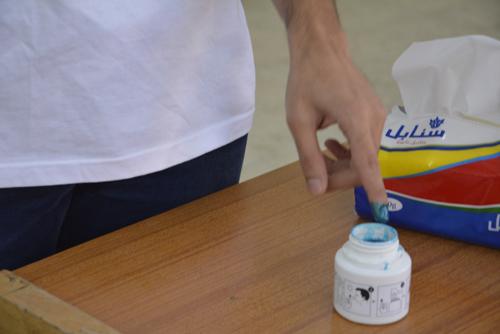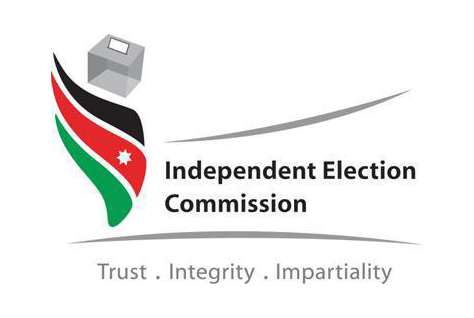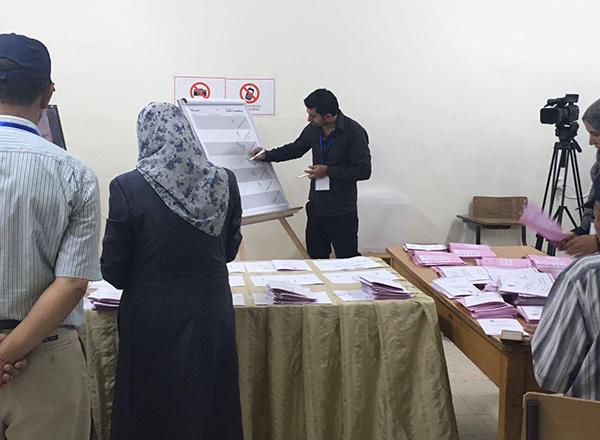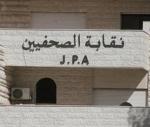You are here
One candidate standing per 3,204 voters — monitors
By Laila Azzeh - Aug 24,2016 - Last updated at Aug 24,2016
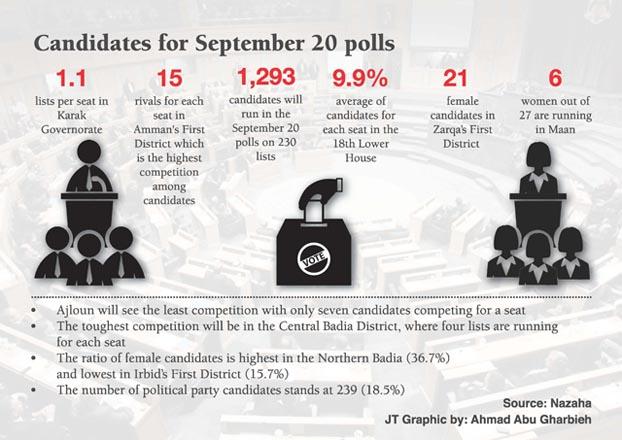
AMMAN — A total of 1,293 candidates will run in the upcoming parliamentary elections on 230 lists, a ratio of one candidate for every 3,204 voters, election monitors said on Tuesday.
According to the Integrity Coalition for Election Observation (Nazaha), an umbrella of 17 civil society organisations, there is an average of 9.9 candidates for each seat in the 18th Lower House, with 1.7 lists competing for each seat.
“Amman’s 1st District will witness the highest competition among candidates, with 15 rivals for each seat, while Ajloun will see the least competition with only seven candidates competing for a seat,” said Nazaha President Mohammad Husseini during a press conference.
In terms of lists, the toughest competition will be in the Central Badia District, where four lists are running for each seat, compared with an average of 1.1 lists per seat in Karak, making it the district with the least competition.
Overall, the number of candidates has dropped by 237 for the September 20 polls, compared with the 2013 elections, a decrease of 20 per cent, according to Nazaha.
Meanwhile, 259 women are running for election this year, making up 16 per cent of all candidates.
The strongest showing for women is in Zarqa’s 1st District, with 21 female candidates, while the lowest participation is in Maan, where only six women are running, out of 27 candidates.
The ratio of female candidates is highest in the Northern Badia, at 36.7 per cent, and lowest in Irbid’s 1st District, where only 15.7 per cent of candidates are female.
“Despite the increase in the percentage of women voters, which stands at 50 per cent, the number of women running for election does not exceed 0.01 per cent of the total voters,” noted Husseini.
Meanwhile, the number of political party candidates stood at 239, comprising 18.5 per cent of all candidates.
“Balqa and Zarqa’s 1st districts have the highest number of candidates [affiliated with political parties], standing at 21 and 25 per cent respectively of the total number of candidates,” said Husseini.
No candidate representing a political party will run in the Southern Badia district, while only one candidate in Ajloun represents a party, out of 29 candidates in the district.
Irbid’s 1st District registered the highest ratio of candidates from political parties (28 per cent).
According to the coalition, 35 per cent of the partisan candidates represent Islamist parties, 55 per cent centrists and 10 per cent leftist and nationalist parties.
Meanwhile, Nazaha said the voter registration process had gone smoothly, with only minor violations.
However, it criticised the “unclear” criteria of representation of districts in the coming House, saying that the representation gap in Amman is the highest.
“There are 1,559,329 voters and 29 seats in Amman, meaning that 40 per cent of the voters are competing for 25 per cent of the seats with a gap of 15 per cent,” said Husseini.
A total of 99 candidates from the 17th House will compete in the upcoming elections, while the total number of former MPs running in this year’s polls stands at 170.
As for the coalition’s role on elections day, Husseini noted that 3,000 observers will be monitoring the process.
“Sixty per cent of the ballot boxes will be fully observed by us, while the rest will be partially monitored. We will also do our own counting projections of the results and compare them with the actual outcomes,” he said.
Nazaha’s election observation process is funded by the EU, according to the coalition’s president, who added that local and international observers will be allowed to monitor the elections.
“The government also invited diplomatic missions to monitor the ballots in addition to the three delegations of international observers from the EU, [the National Democratic Institute] and the Arab League,” Husseini highlighted.
Nazaha will hand its reports on the elections directly to the Independent Election Commission.
Led by the Identity Centre, the coalition seeks to enhance citizens’ trust in the parliamentary elections by reducing violations.
Related Articles
AMMAN — The national coalition to monitor the parliamentary elections on Tuesday notified the Independent Election Commission of violations
AMMAN — The Independent Elections Commission (IEC) on Tuesday said the number of political parties’ members in the local districts who are r
AMMAN –– The Islamic Action Front (IAF), the political arm of the Muslim Brotherhood, expects to win between 15 to 20 seats in the 18th Parl


